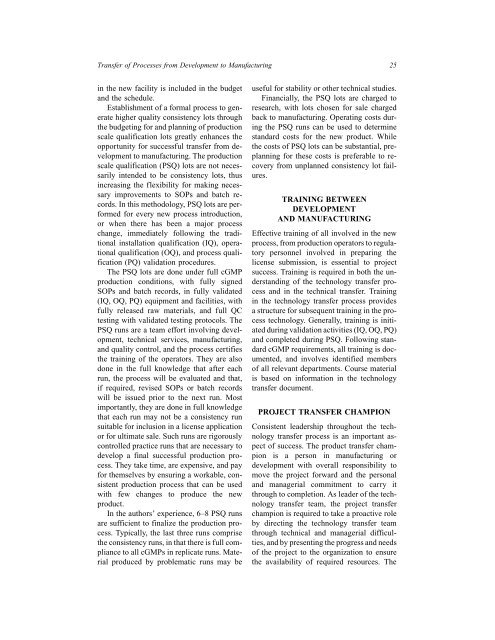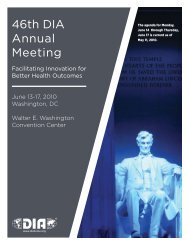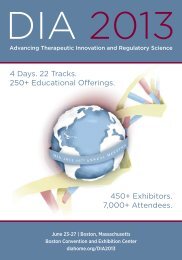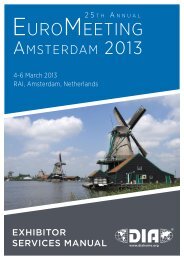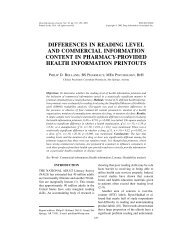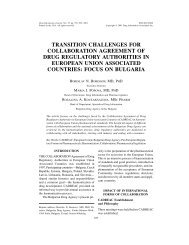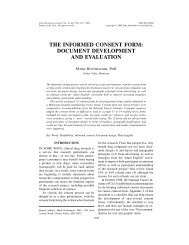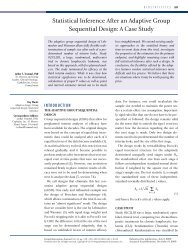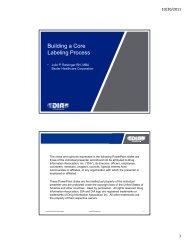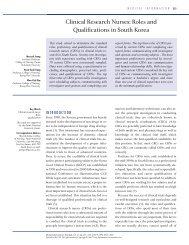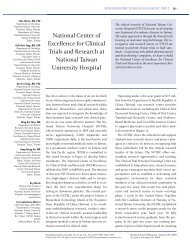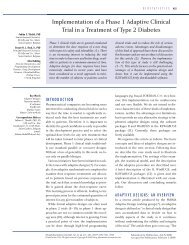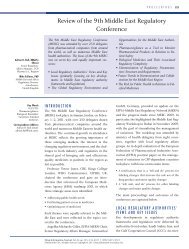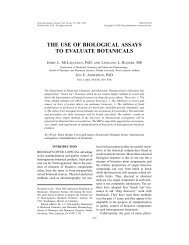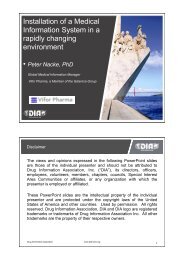transfer of processes from development to manufacturing - Drug ...
transfer of processes from development to manufacturing - Drug ...
transfer of processes from development to manufacturing - Drug ...
Create successful ePaper yourself
Turn your PDF publications into a flip-book with our unique Google optimized e-Paper software.
Transfer <strong>of</strong> Processes <strong>from</strong> Development <strong>to</strong> Manufacturing 25<br />
in the new facility is included in the budget useful for stability or other technical studies.<br />
and the schedule.<br />
Financially, the PSQ lots are charged <strong>to</strong><br />
Establishment <strong>of</strong> a formal process <strong>to</strong> gen- research, with lots chosen for sale charged<br />
erate higher quality consistency lots through back <strong>to</strong> <strong>manufacturing</strong>. Operating costs dur-<br />
the budgeting for and planning <strong>of</strong> production ing the PSQ runs can be used <strong>to</strong> determine<br />
scale qualification lots greatly enhances the standard costs for the new product. While<br />
opportunity for successful <strong>transfer</strong> <strong>from</strong> de- the costs <strong>of</strong> PSQ lots can be substantial, prevelopment<br />
<strong>to</strong> <strong>manufacturing</strong>. The production planning for these costs is preferable <strong>to</strong> re-<br />
scale qualification (PSQ) lots are not neces- covery <strong>from</strong> unplanned consistency lot fail-<br />
sarily intended <strong>to</strong> be consistency lots, thus<br />
increasing the flexibility for making necesures.sary<br />
improvements <strong>to</strong> SOPs and batch records.<br />
In this methodology, PSQ lots are performed<br />
for every new process introduction,<br />
or when there has been a major process<br />
TRAINING BETWEEN<br />
DEVELOPMENT<br />
AND MANUFACTURING<br />
change, immediately following the tradi- Effective training <strong>of</strong> all involved in the new<br />
tional installation qualification (IQ), opera- process, <strong>from</strong> production opera<strong>to</strong>rs <strong>to</strong> regulational<br />
qualification (OQ), and process quali- <strong>to</strong>ry personnel involved in preparing the<br />
fication (PQ) validation procedures. license submission, is essential <strong>to</strong> project<br />
The PSQ lots are done under full cGMP success. Training is required in both the unproduction<br />
conditions, with fully signed derstanding <strong>of</strong> the technology <strong>transfer</strong> pro-<br />
SOPs and batch records, in fully validated cess and in the technical <strong>transfer</strong>. Training<br />
(IQ, OQ, PQ) equipment and facilities, with in the technology <strong>transfer</strong> process provides<br />
fully released raw materials, and full QC a structure for subsequent training in the protesting<br />
with validated testing pro<strong>to</strong>cols. The cess technology. Generally, training is initi-<br />
PSQ runs are a team effort involving devel- ated during validation activities (IQ, OQ, PQ)<br />
opment, technical services, <strong>manufacturing</strong>, and completed during PSQ. Following stan-<br />
and quality control, and the process certifies dard cGMP requirements, all training is doc-<br />
the training <strong>of</strong> the opera<strong>to</strong>rs. They are also umented, and involves identified members<br />
done in the full knowledge that after each <strong>of</strong> all relevant departments. Course material<br />
run, the process will be evaluated and that, is based on information in the technology<br />
if required, revised SOPs or batch records<br />
will be issued prior <strong>to</strong> the next run. Most<br />
<strong>transfer</strong> document.<br />
importantly, they are done in full knowledge<br />
that each run may not be a consistency run<br />
PROJECT TRANSFER CHAMPION<br />
suitable for inclusion in a license application Consistent leadership throughout the techor<br />
for ultimate sale. Such runs are rigorously nology <strong>transfer</strong> process is an important as-<br />
controlled practice runs that are necessary <strong>to</strong> pect <strong>of</strong> success. The product <strong>transfer</strong> cham-<br />
develop a final successful production propion is a person in <strong>manufacturing</strong> or<br />
cess. They take time, are expensive, and pay <strong>development</strong> with overall responsibility <strong>to</strong><br />
for themselves by ensuring a workable, con- move the project forward and the personal<br />
sistent production process that can be used and managerial commitment <strong>to</strong> carry it<br />
with few changes <strong>to</strong> produce the new through <strong>to</strong> completion. As leader <strong>of</strong> the tech-<br />
product. nology <strong>transfer</strong> team, the project <strong>transfer</strong><br />
In the authors’ experience, 6–8 PSQ runs champion is required <strong>to</strong> take a proactive role<br />
are sufficient <strong>to</strong> finalize the production pro- by directing the technology <strong>transfer</strong> team<br />
cess. Typically, the last three runs comprise through technical and managerial difficul-<br />
the consistency runs, in that there is full com- ties, and by presenting the progress and needs<br />
pliance <strong>to</strong> all cGMPs in replicate runs. Mate- <strong>of</strong> the project <strong>to</strong> the organization <strong>to</strong> ensure<br />
rial produced by problematic runs may be the availability <strong>of</strong> required resources. The


